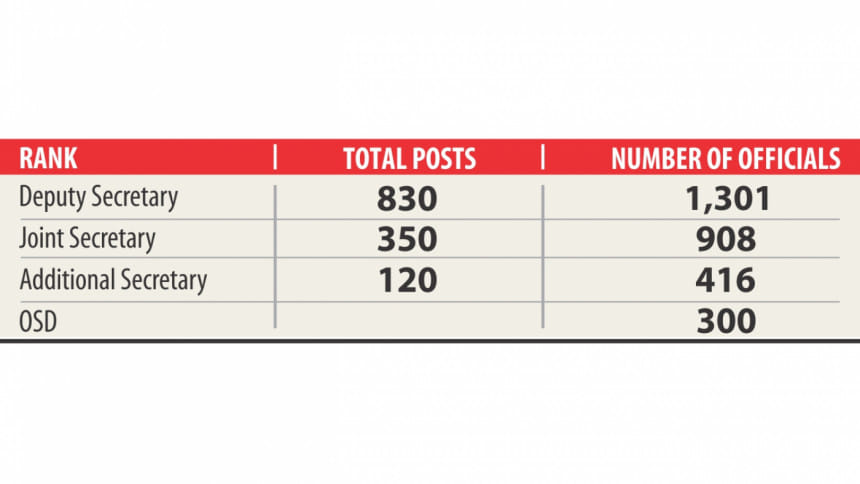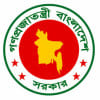Promotion for commotion

The already top-heavy civil bureaucracy is set to get even heavier, as the government is going for another mass promotion to the ranks of additional, joint and deputy secretaries amid allegations of lobbying and nepotism over promotions.
Around 300 officials, mostly from the admin cadre, are to be elevated to higher positions soon apparently to ease commotion among the officials who have been denied promotion several times, said sources at the public administration ministry.
The number would double if the government decides to promote the senior assistant secretaries belonging to the 21st and 22nd batches of Bangladesh Civil Service. At least 442 officials of the two batches, who completed 12 years of service, are eligible to be deputy secretary.
The Superior Selection Board, headed by the cabinet secretary, is expected to send a list of prospective officials to the prime minister soon for approval, said the sources.
The secretary to the Prime Minister's Office, finance secretary, public administration secretary and home secretary are members of the board.
Talking to The Daily Star recently, Cabinet Secretary M Shafiul Alam admitted to the fact that further promotion would make the civil administration top-heavy. He said the officials deprived of promotion would be elevated to higher positions as part of “a routine work”.
Kamal Abdul Naser Chowdhury, senior secretary at the public administration ministry, said they were examining the grounds for giving promotion to the aggrieved officials.
The government move will deal a heavy blow to the ideal pyramid structure of bureaucracy, as the promotions will not be made against vacant posts. Already, officials two to four times the usual number are holding the posts of additional, joint and deputy secretaries, said the sources.
In April last year, the government gave wholesale promotions to 873 officials to the ranks of additional, joint and deputy secretaries.
Since then, many of the promoted officials have been working as in-situ (officials who hold the same office and discharge the same duty after elevation), an unusual practice in civil bureaucracy.
Further promotion will turn the bureaucracy more top-heavy and see a rise in the number of in-situ officials. It will also pose a big challenge for policymakers to accommodate these promoted officials.
As the government move is nearly finalised, many prospective officials -- from deputy secretary to additional secretary -- are lobbying with top bureaucrats and political leaders to get promoted, pressing that though eligible, they didn't get promotion last year.
“I have been getting assurances since 2012 that I would be promoted to the rank of joint secretary, but I didn't get it in the end,” said a deputy secretary of the 1985 BCS batch, seeking anonymity.
Some officials of the BCS batches of '83, '84 and '85 echoed his words. They hoped they would not be deprived this time.
Ideally, promotion is given against a vacant post. And once an official is promoted, he usually gets a new office and responsibilities along with a hiked salary and benefits. But this has not been followed for years.
Due to the absence of a law or specific yardstick, promotion is given on the basis of merit list, annual confidential report (ACR), experience and service records (whether an official is facing corruption or criminal cases).
There have been allegations that some officials are involved in hectic lobbying to get promoted. Some of them claim themselves as ruling party loyalists while some brand others as anti-government elements. Going against the norm, some meet top bureaucrats and pleads for promotion.
“Of the officials, those who have strong political lobby or blessings of their seniors get promotion easily,” said a home ministry official, asking not to be named.
Many officials having better qualification are denied promotion, throwing the entire process into question. Moreover, the controversial ACR system allows many less qualified officials to get good marks just by pleasing their superiors, said the official.
Assuming power in 2009, the Awami League-led government gave mass promotions in the civil administration. The trend continued in the following years.
Instead of merit and competence, nepotism, political consideration and lobbying with top officials of the ministry, the cabinet division and the PMO have been dominant factors in getting promotion, according to a number of serving and retired bureaucrats.
This has caused frustration among many deprived but qualified officials, hampering their performance as well as professionalism in bureaucracy, they alleged.
The cabinet secretary, however, refuted such claims. “Merit and competence are always considered in promoting an official,” he said.
Some retired secretaries said such mass promotion is unjustified. They said the acceptable policy would be to give promotion against vacant posts and in the interest of the state, not in the interest of individuals.
“The government should be highly selective in giving promotions to posts above deputy secretary,” former cabinet secretary Ali Imam Majumder told this correspondent.
It would be disgraceful if jurisdictions of the promoted officials are not expanded, he said.
Another former secretary, Ali Akbar, believes it is a bad precedence to give large-scale promotions without creating posts. It hampers efficiency of bureaucrats, he added.

 For all latest news, follow The Daily Star's Google News channel.
For all latest news, follow The Daily Star's Google News channel. 








Comments